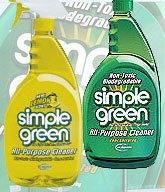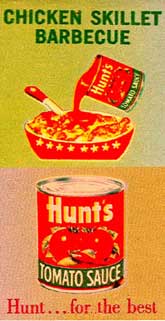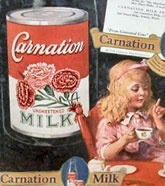Contact BBQbyDan
www.BBQDan.com
Search
KCBS BBQ Cook-Off Info
Recipes,
Smoking Meats
Recipes, Grilling
|
 |
FAQ OF THE INTERNET BBQ LIST Version 2.0 Sections 9.2, 9.3 Rubs, Marinades, Mops and Barbecue Sauces Marinades and Mops |
-------------------
[Do marinades really tenderize the meat?]
Jim Tarantino--
From his book, "Marinades":
First of all, marinades do not tenderize food. They soften and denature it. Tenderizing occurs in food when muscle tissue is separated, torn, or bruised. Tenderizing, for example, occurs when a cook pounds a chicken breast or a veal scallop with a kitchen mallet. Marinades soften or denature tissue with their acid ingredients."
"Marinades do not penetrate deeply into muscle tissue. When a marinade hits the surface of meat or poultry, the muscle tissue softens and expands; in some cases this stops penetration."
Paraphrasing here: Marinades are made up of three parts with three specific flavor roles. The first is acid, such as wine, vinegar, citrus juice, or yogurt, acting as a softening agent. The second is oil, which adds flavor and moisture. The third is the aromatics that give the marinade its aroma and flavor.
Jim Tarantino's Basic Beef Marinade
Amount |
Measure | Ingredient | Preparation Method |
1/4 |
cup | sherry vinegar or red wine vinegar | |
1/2 |
cup | dry red wine | |
2 |
tablespoons | soy sauce | |
1 |
tablespoon | Worcestershire sauce | |
1 |
teaspoon | sugar | |
1/2 |
cup | olive oil | |
2 |
cloves | garlic | sliced |
2 |
tablespoons | parsley, fresh | chopped |
2 |
tablespoons | fresh herb combo: | rosemary, tarragon, thyme |
1 |
dash | black pepper to taste |
Combine the vinegar, wine, soy sauce, Worcestershire sauce, and sugar in a non-reactive mixing bowl. Whisk in olive oil a little at a time. Add the pepper, parsley and herbs.
For beef steaks marinate for 6 to 8 hours. For roasts and brisket, 10 to 12 hours.
==============Jim Tarantino's Basic Chicken Marinade
Amount |
Measure | Ingredient | Preparation Method |
1/2 |
cup | fresh orange juice | |
1/4 |
cup | fresh lemon juice | |
1 |
teaspoon | Dijon-style mustard | |
1 |
teaspoon | Worcestershire sauce | |
1/4 |
cup | canola oil | |
3 |
cloves | garlic | |
1/4 |
cup | fresh parsley | minced |
1 |
teaspoon | dried oregano | chopped |
1 |
dash | kosher salt to taste | crushed |
1 |
dash | black pepper to taste | |
Combine the orange and lemon juice, mustard, and Worcestershire sauce in a glass bowl. Whisk in the oil a little at a time. Add remaining ingredients.
Chicken breasts should marinate 3 to 4 hours. Wings 4 to 6 hours.
-------------------
[Can you tell me some more about marinades?]
Ed Pawlowski--
Below is some information on marinating meat from the "Cooks Bible", published by Cooks Illustrated. Most of us marinate meat so I thought it would be of interest. It also recommends putting the meat and marinade in a plastic bag instead of a bowl and shaking it once in a while to distribute the solution.
Why don't marinades make meat more tender?
Harold McGee, in "On Food and Cooking", points out that enzymes (many marinades contain enzymes such as papaya or pineapple) do not work effectively at room temperatures and are especially impotent when left at 40F in a refrigerator. He also points out that marinades that contain wine, vinegar, and/or citrus juices will denature the surface proteins, resulting in drier meat (when protein is denatured it uncoils and loses water). And, as I experienced in my testing, marinades don't get deep down into the meat, causing a change of texture only on the surface. Puncturing meat with a fork, for example, to gain access to the interior, has little effect, although it will enhance the loss of meat juices during cooking, an unintended and adverse effect.
Master Recipe for Fish Marinade
Amount |
Measure | Ingredient | Preparation Method |
2 |
teaspoons | cumin seeds | toasted |
2 |
tablespoons | fresh cilantro | minced |
1 |
fresh hot chili pepper | seeded, minced | |
4 |
cloves | garlic | peeled, minced |
1 |
tablespoon | fresh ginger | minced |
1/4 |
cup | lime juice, | freshly squeezed |
1/4 |
cup | dry white wine | |
1 |
teaspoon | kosher salt | |
1/2 |
teaspoon | sugar | |
1/2 |
cup | olive oil | |
Combine ingredients.
Makes enough marinade for 2 pounds of fish.
This marinade is particularly good as a sauce for the cooked fish. Set aside some of it before you marinate the fish.
This is similar to the beef marinade but uses lemon juice instead of balsamic vinegar. Chicken is more delicate, so I use less garlic and rosemary.
Master Recipe for Poultry Marinade
Amount |
Measure | Ingredient | Preparation Method |
1/2 |
cup | olive oil | |
4 |
cloves | garlic | peeled and lightly crushed |
1 |
tablespoon | minced fresh rosemary or thyme | |
1/4 |
cup | lemon juice | |
| dash | black pepper to taste | freshly ground |
Heat olive oil in a small saucepan. Add garlic and rosemary and let cook over low heat for 5 minutes. Remove from heat and let steep for 10 minutes. Strain oil through a sieve. Add lemon juice and pepper and stir to mix. Makes enough marinade for 1 chicken, butterflied or cut into parts. Marinate 3-4 hours.
==============Carey Starzinger--
Mustard-Herb Marinade for Chicken
Amount |
Measure | Ingredient | Preparation Method |
1/2 |
cup | Dijon Mustard | |
2 |
tablespoons | dry mustard | |
2 |
tablespoons | vegetable oil | |
1/4 |
cup | dry white wine | |
2 |
tablespoons | tarragon, dried | |
2 |
tablespoons | thyme, dried | |
2 |
tablespoons | sage, dried | crushed |
Mix all of the ingredients in a bowl. Let stand 1 hour. Add chicken and coat well. Let chicken sit in marinade 3-4 hours. Pat dry with paper towels. Use the remaining marinade to baste chicken just before removing from the grill. Source: Mesquite Cookery by John "Boog" Powell
-------------------
[Can someone give me a good marinade for brisket?]
Edward Spiegel--
I prepared the brisket by using the 'All-American Rub'. I then stuck it into a large (2 gallon) Ziploc bag into which I poured the following:
Ed's Special Brisket Marinade
Amount |
Measure | Ingredient | Preparation Method |
1/2 |
bottle | beer | |
1 |
cup | apple cider vinegar | |
1/2 |
cup | brown sugar | |
3 |
drops | orange oil | |
1 |
pinch | cinnamon | |
2 |
teaspoons | salt |
I let it marinate overnight. The brisket was great!
-------------------
[If I use a marinade on my meat, can I safely use the leftover marinade in my sauce?]
Bill Martin--
Heat the leftover marinade gently to boiling, turn it down and let it simmer for about 20 minutes. This should take care of any bacteria that may be in the marinade.
==============
Editor--The marinade should generally have no more bacteria in it than was on the meat that was marinated. Often the marinade will have fewer bacteria due to the makeup of the marinade (acid content, alcohol content, etc.) Don't let the marinade sit around at room temperature. Heat it as soon as the meat is finished marinating and then store it in the refrigerator until it's time to add it to your sauce.
-------------------
[Can you give me some ideas for injection marinades?]
Glen Dikes--
Injection Marinades. Try pureeing "Paul Newman's Italian Salad Dressing" and injecting it. I have also used "Figeuroa" brand Mesquite Fajita marinade cut with Burgundy wine and water. Also for leaner cuts of beef, I use a mix of olive oil, red wine vinegar, garlic powder, onion, and other herbs as I see fit on the day in question. I also use quite a bit of cumin for that South West flavor. I know, I know . . . there are no measurements listed because I don't use them except to bake. Experimentation can be the spice of life!
--------------------[What is the difference between a mop, a sop and a basting sauce?]
Editor--
A mop, a sop and a basting sauce are all basically the same. A liquid that you put on the meat while it cooks. A basting sauce may be somewhat thicker than a mop or a sop.
--------------------[Can someone discuss the effects that oil-based mops have on moisture retention while barbecuing?]
Danny Gaulden--
I didn't figure this out by being a genius, but by doing and observing what was going on every time I smoked something. I don't know anything about the science behind what I am about to say but I just know that it works for me and makes a much better product. My store pit, being a carousel-type, helps me produce the best ribs, brisket, etc. that I've ever eaten. Yet when I would barbecue the same cuts of meat at home on my Klose horizontal off-set firebox pit, they were always drier and not as tender. "Why is this?" I thought. So I started looking at my several pits and how they cooked differently. The store pit always has a good load of meat in it and especially many fat briskets. I noticed that when I pulled my ribs off of this pit, they always had a shine on them, and were just plain wet with drippings from the briskets, butts, and other fatter cuts of meat on the rotisserie. Didn't take me long to figure out what was the problem at home on my horizontal pits--they do not have the ability to have the "meat drippings" from the other meats drip down to the next rack, and self baste themselves. Bingo! The result of this not happening in my Klose pit is drier ribs, briskets, etc. So I started making up an oil-based mop. I put in a small shot of zesty spices, plus a little Worcestershire sauce. I love that stuff and what it does to beef and pork. Don't put on too much to overpower the meat, just enough to give a nice flavor that one would say "Ummm, that's good, what am I tasting here?" Remember, the key to good seasoning is to produce a great flavor, but not to make it so strong that one can pick out the ingredients.
So every hour or so (maybe a little less), I will brush on my oil mixture on everything I cook in my horizontal pits. I try to duplicate what happens in the rotisserie pits. To answer your question on "oil based mops, and moisture retention": Oil hangs around a lot longer on the meat than water, vinegar, etc. I assume it's because of its chemical make-up, and the fact that oil has a much higher heat tolerance and evaporation point vs. water or vinegar-based mops. It is like a little guard around you meat--it takes the beating from the heat (to a point), and protects the meat under it and helps keep in the moisture. All I know is that it works, and I will continue doing it. But remember that you still have to keep your temperature up high enough to cook the meat, not dry it out. The oil or fat can only go so far. Pit temperatures of 240-250F are the key to a great piece of barbecue. Also, in a horizontal pit, like the Klose, remember to turn and rotate the meat to even out the heating.
If you like the flavor that olive oil imparts, then by all means use it. If you don't, then use a blander tasting vegetable oil. Ribs aren't exactly what a health conscious one would call a healthy food. I just don't think the oil, if considered in the whole picture, makes that much difference to ones health when eating the things we all like to barbecue. Plus a lot of the oil cooks away. I have been using Crisco salad oil, for I like to bake with it. So rather than have different oils around, I use that and it works fine for me.
Try this. Get a 2 or 3 inch pastry brush, and brush on a little oil on the top and bottom of your ribs, then apply your rub. Don't use a rub that you have to "pile" on, for it will burn a bit during the smoking process and make your ribs "ugly". Use a rub that is fairly stout in flavor and doesn't require a heavy coating to attain its goal. Don't rub it in after you apply the oil, for that will make the rub bunch up in places. Just press it in with your hand, and let it be. [Editor--try David Klose's dry rib rub found in the Rib section.]
Keep your pit in the 240-250F range. After 45 minutes or so, check the ribs, and see if they are starting to look dry. If they are, brush on a little more oil. Continue this for about 3 hours, or until the fat from the ribs starts to come up and baste the meat on its own. At that point, you can stop worrying about mopping with the oil. Give this a try, and I know you will be a happy barbecuer.
-------------------
[I was thinking about using the oil basting technique to keep the meat in the smoker more moist. My only question now is: How does it effect smoke penetration and bark?]
Danny Gaulden--
I wondered the same thing before I tried this at home. I keep three kinds of wood here at the house most of the time--green, half green, and well-seasoned. That way, I can control my fire to a fine art, and eliminate most of the problems that a lot of people have using just one kind of wood. I get smoke when I want it, and I get a good clean heat when I want it. Plus I get great temperature control. Anyway, the answer to your questions are: You will still get great smoke penetration and you will also get a great bark. If you keep the temperature up around 240 to 250F in your pit, you will get a great bark and good things will happen.
-------------------
[Can you give me some more recipes for mops?]
Carey Starzinger--
General-Purpose Mop for all Barbeque Meats
Amount |
Measure | Ingredient | Preparation Method |
1 1/2 |
tablespoons | salt | |
1 1/2 |
tablespoons | dry mustard | |
1 |
tablespoon | garlic powder | |
1 |
tablespoon | chili powder | |
1 1/2 |
tablespoons | paprika | |
1 |
tablespoon | hot pepper sauce | (like Texas Pete or Tabasco) |
1/2 |
quart | Worcestershire sauce | |
1/2 |
pint | vinegar | |
2 |
quarts | beef bone stock | |
1/2 |
pint | vegetable oil | |
1 1/2 |
tablespoons | MSG (optional) |
To make bone stock, buy stout beef bones and bake them in a medium oven for about 2 hours then boil them in water. Add all the other ingredients to the bone stock and let mixture stand overnight in the refrigerator before using. You can use canned beef stock, but it's not as good.
Use this mop to baste meats while cooking. Keep leftover mop refrigerated.
Source: Walter Jetton's LBJ Barbeque Cook Book
==============Diddy-Wa-Diddy Mop and Dipping Sauce
Amount |
Measure | Ingredient | Preparation Method |
1 |
teaspoon | black pepper | |
1 |
teaspoon | salt | |
2 |
teaspoon | hot pepper sauce | (like Texas Pete or Tabasco) |
1 |
cup | white vinegar | |
2 |
cups | grape juice |
Combine all ingredients in a jar. Tighten lid and shake until blended. This sauce may be served at room temperature or heated.
"This is a simple flavor enhancer", Remus tells me. "It's thin enough to read today's headlines through--but not so thin that a politician can." Remus assures me that this authentic sauce can be used as a mop during cooking and as a dip after your meat has been taken off the grill. For beef and pork. [Editor—This mop will be improved by the addition of 1 cup of vegetable oil.]
Source: The Great Barbecue Companion, Mops, Sops, Sauces, and Rubs by Bruce Bjorkman.
==============Mel's Moppin' Sauce
Amount |
Measure | Ingredient | Preparation Method |
1 |
cup | cider vinegar | |
5 |
tablespoons | Worcestershire Sauce | |
2/3 |
cup | vegetable oil | |
3 |
tablespoons | butter | |
1 |
whole | lemon | thinly sliced, with peel on |
3 |
cloves | garlic | minced |
3 |
tablespoons | ginger | grated |
2 |
tablespoons | dry mustard |
Combine all ingredients in a saucepan and heat until flavors are nicely blended, about 15 minutes. After it cools, strain the lemon slices out.
Source: The Great Barbeque Companion, mops, sops, sauces and rubs by Bruce Bjorkman.
==============Danny Gaulden--
Try this on your chicken for a butter baste mop the next time you barbecue.
Danny's Lemon-Butter Basting Sauce
Amount |
Measure | Ingredient | Preparation Method |
1 |
cup | melted butter or margarine | |
2 |
teaspoons | white pepper | |
1/4 |
cup | lemon juice | |
2 |
teaspoons | paprika | |
2 |
teaspoons | celery salt | |
2 |
teaspoons | onion powder | |
2 |
teaspoons | granulated garlic | |
1 |
teaspoon | sugar |
Just put the ingredients into a sauce pan and heat it up. Put the chicken halves in the smoker and keep that temperature at 240-250F. Mop the chicken every 30 minutes or so until it's done, 170F internal temperature.
-------------------
[When I make an oil-based mop, the oil and fruit juice always separates, making mopping difficult. Any tips?]
Editor--
Make up an oil-based mop, allow it to cool and put it into an empty 1 quart Mason jar. Put on the lid and shake the mop vigorously and then pour the mixture into a bowl. The oil and water mixture will now stay in suspension for several minutes. Mop the meat immediately. Then pour the mop liquid back into the Mason jar and cap it and then repeat the procedure the next time you need to mop.
You can download all the recipes in this FAQ ![]() Click here
Click here
Go to the next section
Return to the Table of Contents
Return to the BBQ FAQ Home Page
Comments or Suggestions
BBQ FAQ Ver 1.0, 2.0 ©1997, 1998 William W. Wight. All rights reserved.

















